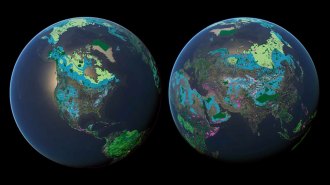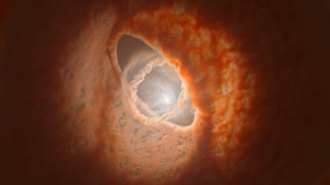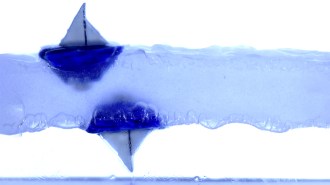Uncategorized
-
 Animals
AnimalsSea butterflies’ shells determine how the snails swim
New aquarium videos show that sea butterflies of various shapes and sizes flutter through water differently.
-
 Science & Society
Science & SocietyCreative school plans could counter inequities exposed by COVID-19
Many K–12 schools this fall are virtual, which could widen the nation’s already large opportunity gaps. What are schools doing to reach all students?
By Sujata Gupta -
 Computing
ComputingHow next-gen computer generated maps detect partisan gerrymandering
The U.S. census will trigger a new round of redistricting beginning in 2021. Researchers have developed numerous tests to identify gerrymandering.
By Sujata Gupta -

Where do we draw the line between life and death?
Editor in chief Nancy Shute writes about the challenges of defining brain death and the first GM mosquitoes in the United States.
By Nancy Shute -

-
 Ecosystems
EcosystemsProtecting half the planet could help solve climate change and save species
An analysis lays out where new land protections could complement existing protected areas to achieve various conservation and climate goals.
-
 Life
LifeThis parasitic plant eavesdrops on its host to know when to flower
Dodder plants have no leaves to sense when to bloom, so the parasites rely on a chemical cue from their hosts instead.
-
 Genetics
GeneticsStrict new guidelines lay out a path to heritable human gene editing
But scientists say making changes in DNA that can be passed on to future generations still isn’t safe and effective, yet.
-
 Space
SpaceA weirdly warped planet-forming disk circles a distant trio of stars
The bizarre geometry of a disk of gas and dust around three stars in the constellation Orion could be formed by “disk tearing” or a newborn planet.
-
 Climate
ClimateBering Sea winter ice shrank to its lowest level in 5,500 years in 2018
Peat cores that record five millennia of climate shifts in the Arctic region suggest recent ice loss is linked to rising carbon dioxide levels.
-
 Health & Medicine
Health & MedicineSteroids reduce deaths of critically ill COVID-19 patients, WHO confirms
The finding strengthens evidence that clinicians should give the drugs to people who are severely sick from the coronavirus.
-
 Physics
PhysicsToy boats float upside down underneath a layer of levitated liquid
The upward force of buoyancy keeps objects afloat even in unusual conditions.